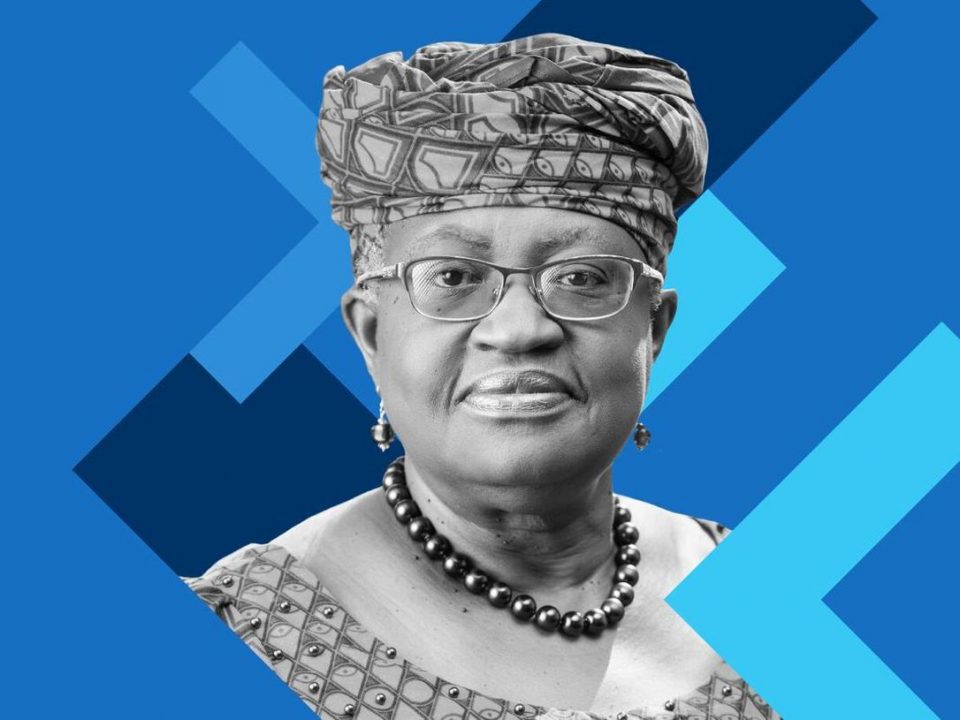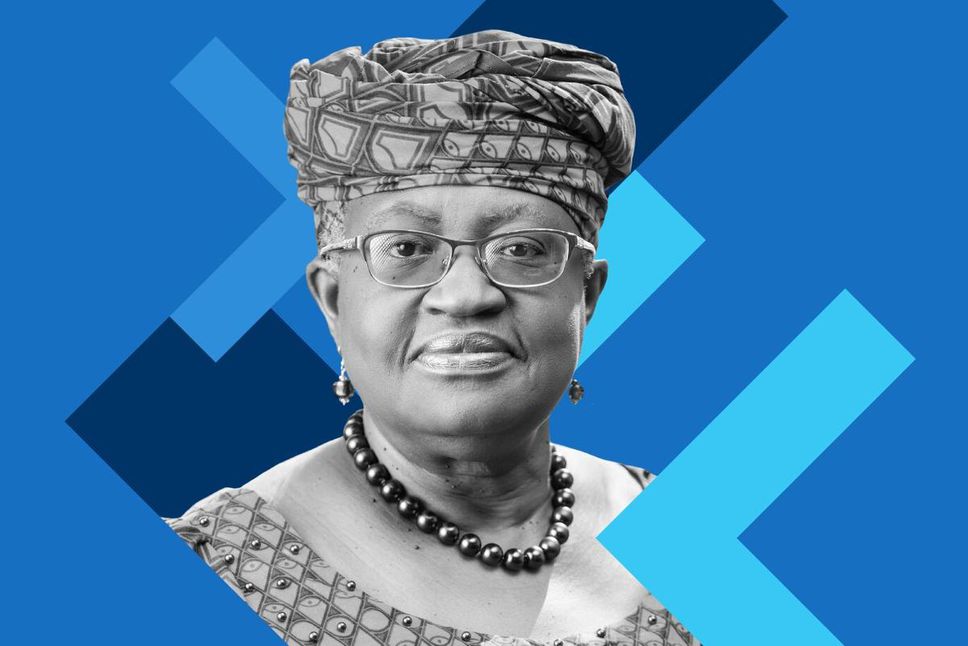Before the pandemic, did you ever think about supply chains? The trucks, ships, ports, warehouses, cargo planes and railroads that link global trade to move stuff to customers and consumers?
For decades, globalized trade has grown. But with clogged ports, shortages of everything from microchips to bathtubs, bridges blocked by protesters and now Russia’s invasion of Ukraine and the economic sanctions that accompany it, we’ve been reminded just how fragile global trade flows can be.
There’s also the risk of food security, given that Russia and Ukraine supply almost a quarter of the world’s wheat. And then there’s income and wealth inequality, leading to protectionism amidst a shakier world order.
I spoke with World Trade Organization Director General Ngozi Okonjo-Iweala from her office in Geneva about global supply chain issues, whether the world is de-globalizing and what keeps her up at night:
Howard Green: Welcome to Connexion.
Thank you, Howard.
You’re the first female in the job at the top of the WTO, the first African. You were 25 years at the World Bank and the number two position there. Tell us a little bit about your history; where you grew up, your journey, your parents. I understand you come from royal lineage?
I grew up in Nigeria, and yes, my family is the royal family of a kingdom. I grew up with my grandmother in the village. My parents went abroad to study when I was quite young. My father had studied mathematical economics and statistics in Germany, so he did his PhD, and my mother, a sociologist. And then when they came back, by then I had been a village girl and I moved with them to the University of Ibadan, where both of them were working at the time. I went to secondary school in Nigeria, and then I did the equivalent of the A-levels and decided to study abroad. I made the choice to go to Harvard University and the rest is history. (I got my) PhD from MIT in regional economics. What motivated me throughout my education and career really has been trying to make a difference in terms of the greater good for people in my country, for people globally.
What is the WTO and why should everybody care about it?
What attracted me to the World Trade Organization, is that (it) is about people. The founding purpose of this organization is to help enhance living standards of people in the world, to help create employment and support sustainable development. People are at the centre of what this organization is about, and it is supposed to do that through trade — to better people’s lives.
People like Larry Fink, head of BlackRock, the biggest asset manager in the world, say globalization is dead and we’re moving to regionalization of trading blocs. Do you believe that?
Well, I respect Larry Fink a lot, but I don’t believe that (globalization is dead). Maybe in the form that we used to know it in the past, it might be changing. But certainly it’s not dead, and multilateral trade, it’s not dead. Even as we see all these new agreements, 75 per cent of world trade is still on WTO most-favoured nation terms and 22 per cent is on regional and bilateral. There is a lot of talk, a lot of rhetoric. But if you match it with what’s going on on the ground, we still find that multilateral trade is still the predominant mode. Globalization lifted more than a billion people out of poverty, a large number in East Asia and in China in particular, but it did leave some people behind. And I think that what has not been done is looking at what policy instruments governments could deploy in order to make sure that these people are taken care of. Which countries are being left behind and which policies, globally, could bring them into the fold.
Canada and the U.S. trade more than anybody back and forth. But Joe Biden wants to reserve electric vehicle jobs for Americans, even though Canada and the U.S. have had free trade in autos for almost 60 years. And so there’s friction even between us, Canadians and Americans.
Prior to the pandemic, the rough edges around globalization had been evident and been commented upon. I don’t know if people remember that as far back as the late 1990s, Joe Stiglitz wrote a book called “Globalization and Its Discontents,” and at that time it was a bestseller. It tried to point out some of the drawbacks. But I guess globally, we should have paid more attention to trying to mitigate those. It’s evident that there has been some discontent about globalization. The pandemic has heightened some of the difficulties. People began to realize what supply chains are all about and the fact that supply chains may be quite concentrated. Then comes the war in Ukraine, and that highlights problems even more and makes people feel that maybe this is the time not to rely too much on others. But I think we should not draw the wrong conclusions from what is happening. I think drawing the wrong conclusions and saying that we are now going to produce everything at home or onshore or re-shore everything is also a risky strategy. I think we need to look at the concentration. There is nothing wrong with saying, look, instead of producing so much of an item in one place, perhaps to decentralize production a little bit would not be a bad thing.
That’s exactly the Canada U.S. auto thing. It’s about sharing across the continent the production of vehicles, for instance.
Yes. And I think that part of that as a strategy is OK, to deconcentrate production on certain items, particularly items that are necessities. But that could also be done bringing in countries that don’t normally participate. So you see some private sector decentralizing, deconcentrating production not just to Vietnam, but to Bangladesh, to Laos, to Cambodia, to Ethiopia, to Morocco. That’s what I mean by re-globalization. We could use this as an instrument to deconcentrate and bring in those countries and those peoples that benefit as much. Similarly, within a country, you can also look at that and say, well, those areas where we could deconcentrate, that would benefit people. If you combine that with active labour market policies to take care of those who are out of jobs, partly because of technology, by the way, not just globalization. I think that would help. So I think those are more the types of policies we should be looking at. We should try to avoid protectionist policies that says you are going to re-shore things. Why? It’s risky. We’ve got climate change. For instance, what if you re-shore and bring back all your production? Something happens like a flood, a drought, a climate event. You still have to rely on someone somewhere to be able to help you out during that period. So concentrating production is not necessarily always the best risk management strategy.
Trade can be fragile. We saw what happened in the Suez Canal when one ship got stuck. We saw what happened at the Port of Los Angeles when they couldn’t handle all the containers. So those are the kinds of risks, I think, you’re alluding to?
It is, partly that. Those kinds of things happen. So even for a region like Canada and the U.S., if you decide you will produce everything we need between Canada and the U.S., you could have the kinds of issues that you talked about — and then you would be really taking a very risky approach.
I want to raise food security, a very serious issue given the war. How much of a potential danger is there that trade gets blocked and people starve?
I’m very worried about the potential for a real global food crisis, of which poor people and the poorest nations would pay a heavy price. Food prices have already risen 20 to 50 per cent in certain countries. So the potential for difficulty and trouble is real. But if we act fast, we can help mitigate some of this, if other countries would release any surplus stocks that they have. Canada, the U.S., Australia, the EU, any of them that have surplus grains, oil, maize — these could be helpful in managing prices on the world market.
Obviously we’ve had a lot to deal with globally the last few years, COVID to name one. Now the war. We’re trying as a planet to get to net zero. That’s been complicated by the commodity chaos that’s resulted from the war. Is growth and global trade compatible with net zero goals?
Yes. And it’s compatible in two ways. People normally think of trade as contributing to carbon emissions because of the logistics. Now, many of those logistical companies or sectors are really working very hard toward net zero by 2050 itself. So they’re looking at, how do they build new ships that have lower carbon emissions. Flights, how do you reduce carbon emissions of those? But just think about this, too. Lower tariffs can also contribute so that if you have goods that are low-carbon emission compatible or friendly, maybe in one part selling them to another part at lower tariffs will allow other people to use them and to adopt those technologies. And in fact, at the WTO, there were negotiations to see how one can lower tariffs on a list of goods. If you look at certain countries, they’ve already begun to do that and to trade those. So that’s one area in which there can be a real difference.
Do you think the war has complicated that quest for net zero? Because now a lot of other countries are thinking we have to produce more energy so we can get it to Europe, and it might push the net zero quest off track.
Well, I think it could in the sense that that transition might be longer but it could also actually hasten it. What if the thinking is, ‘look how dependent we are on fossil fuels so we better hasten investments in renewables so that we can replace those instead of dragging out the transition?’ So it could cut both ways. But I think in the medium term, the thinking is going to be to move faster towards renewables, and it might actually have a positive rather than a negative effect.
There was friction with China on the trade front before the war, and arguably it’s intensified. Do you think countries will retreat from trading with China, and should they?
At the WTO, we definitely encourage multilateral trade with each other, we don’t encourage retreat. And I think that this is the time you need multilateralism more than ever. It may not be multilateralism as we knew it. But the idea is not to retreat from trading with each other, but to see how to make that trade fairer on a level playing field.
You’ve written a book with the former prime minister of Australia, Julia Gillard. Advice for aspiring women leaders. Can you share some of its salient ideas for any women who may aspire to the kind of trajectory that you’ve had?
A lot of women find that when they are leaders, they have to to walk a very fine line. If you speak gently then people might conclude you are too soft. If you speak strongly, people might say you are too aggressive. So women try to toe this fine line, so their leadership style is a big issue. And at the end of the day, instead of trying to watch yourself all the time, neither too shrill nor too soft, just be yourself. You are a more confident leader when you are who you are and you have confidence in yourself. It’s comforting to know you can lead by being yourself.
What keeps you up at night as head of the WTO?
Worrying that it takes years and years to negotiate an agreement. And I feel that we need to do better than that. If we are trying to negotiate an agricultural agreement or fisheries agreement that is about people, it shouldn’t take years and years. And part of that means, for now, trying to get members to understand that we should limit export restrictions and prohibitions on food. That’s what keeps me up at night. How do we get results for people, on a daily basis.
This interview has been edited for length and clarity.
Listen here or subscribe at Apple Podcasts, Spotify or wherever you listen to your favourite podcasts.
JOIN THE CONVERSATION




